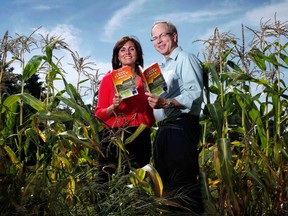
Article content
PORTLAND, Maine (AP) — It’s the Maine one, not the main one _ a 208-year-old, Maine-based publication that farmers, gardeners and others have relied on for planting guidance and weather predictions will publish for the final time.
THIS CONTENT IS RESERVED FOR SUBSCRIBERS ONLY
Subscribe now to read the latest news in your city and across Canada.
- Exclusive articles from Barbara Shecter, Joe O'Connor, Gabriel Friedman, and others.
- Daily content from Financial Times, the world's leading global business publication.
- Unlimited online access to read articles from Financial Post, National Post and 15 news sites across Canada with one account.
- National Post ePaper, an electronic replica of the print edition to view on any device, share and comment on.
- Daily puzzles, including the New York Times Crossword.
SUBSCRIBE TO UNLOCK MORE ARTICLES
Subscribe now to read the latest news in your city and across Canada.
- Exclusive articles from Barbara Shecter, Joe O'Connor, Gabriel Friedman and others.
- Daily content from Financial Times, the world's leading global business publication.
- Unlimited online access to read articles from Financial Post, National Post and 15 news sites across Canada with one account.
- National Post ePaper, an electronic replica of the print edition to view on any device, share and comment on.
- Daily puzzles, including the New York Times Crossword.
REGISTER / SIGN IN TO UNLOCK MORE ARTICLES
Create an account or sign in to continue with your reading experience.
- Access articles from across Canada with one account.
- Share your thoughts and join the conversation in the comments.
- Enjoy additional articles per month.
- Get email updates from your favourite authors.
THIS ARTICLE IS FREE TO READ REGISTER TO UNLOCK.
Create an account or sign in to continue with your reading experience.
- Access articles from across Canada with one account
- Share your thoughts and join the conversation in the comments
- Enjoy additional articles per month
- Get email updates from your favourite authors
Sign In or Create an Account
or
Article content
The Farmers Almanac, not to be confused with its older, longtime competitor, The Old Farmer’s Almanac in neighboring New Hampshire, said Thursday that its 2026 edition will be its last. The almanac cited the growing financial challenges of producing and distributing the book in today’s “chaotic media environment.” Access to the online version will cease next month.
Article content
Article content
Article content
Farmers Almanac was first printed in 1818 and the Old Farmer’s Almanac started in 1792, and it’s believed to be the oldest continually published periodical in North America. Both almanacs used secret formulas based on sunspots, planetary positions and lunar cycles to generate long-range weather forecasts.
Article content
By signing up you consent to receive the above newsletter from Postmedia Network Inc.
Article content
“It is with a heavy heart,” Editor Sandi Duncan said in a statement, “that we share the end of what has not only been an annual tradition in millions of homes and hearths for hundreds of years, but also a way of life, an inspiration for many who realize the wisdom of generations past is the key to the generations of the future.”
Article content
Editors at the other publication noted there’s been some confusion between the two. “The OLD Farmer’s Almanac isn’t going anywhere,” they posted online.
Article content
The two publications come from an era where hundreds of almanacs served a nation of farmers over time. Most were regional publications and no longer exist. Farmers Almanac was founded in New Jersey and moved its headquarters to Lewiston, Maine, in 1955.
Article content
They contain gardening tips, trivia, jokes and natural remedies, like catnip as a pain reliever or elderberry syrup as an immune booster. But its weather forecasts make the most headlines.
Article content
Article content
Scientists sometimes disputed the accuracy of the predictions, and the reliability of the secret formula. Studies of the almanacs’ accuracy have found them to be a little more than 50% accurate, or slightly better than random chance.
Article content
The almanac was a “quaint relic” with a special kind of charm, but its use as a forecasting tool was debatable, said Val Kiddings, a senior fellow at the Information Technology and Innovation Foundation and a longtime researcher of science and agriculture.
Article content
“It might have had some value looking back, as a historical indicator,” Giddings said, “but I never took any of its prognostications at all seriously.”
Article content
Readers, saddened to hear the news, posted online about how they used it in their families for generations as a guide to help them plant gardens and follow the weather.
Article content
In 2017, when Farmers’ Almanac reported a circulation of 2.1 million in North America, its editor said it was gaining new readers among people interested in where their food came from and who were growing fresh produce in home gardens. It developed followers online and sent a weekly email to readers in addition to its printed editions.

.jpg) 2 hours ago
1
2 hours ago
1
 English (US)
English (US)